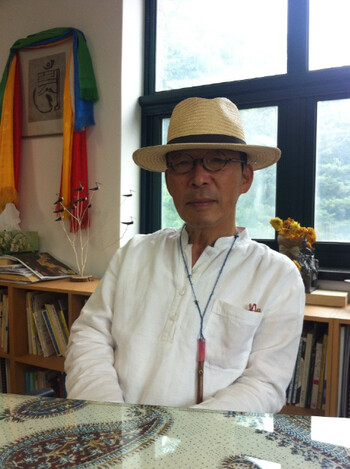hankyoreh
Links to other country sites 다른 나라 사이트 링크
Korea’s #1 cultural planner working on school of Eastern values

By Kim Kyung-ae, senior staff writer
“There are growing reservations and skepticism about whether Western culture really represents the best path for human survival. There is also growing consensus that we need to put Eastern wisdom to work. I’d like to help the next generation find the key to get that wisdom.”
Kang Joon-hyuk retired late last month. But rather than reflecting on his past decade or so of university life, the 65-year-old former dean of the Sungkonghoe University Graduate School of Culture - called the nation’s “number one cultural planner” by many - instead talked about his longstanding dream of developing a “school for Asian culture.”
“It needs to be not just for the young people of Asia, but for Westerners who share Asian values,” said Kang. “We’re already living in a multicultural age, and I think it would be good to take advantage of people with mixed blood, born with a temperament that blends the culture of their fathers and mothers”
What sort of “Asian values” is he thinking of? Kang explained, “In the West, people have valued technology and material things while neglecting the spirit. In art, they have seen talent as separate from character. But in the East, the ideal concept since ancient times has been the humanitarian who is a master of art, music, and skills. The aim has been holistic education that seeks to harmonize the spirit through training in literature and martial arts. If we hope to work together to usher in a more broadly beneficial world, we will need to develop new leaders with that kind of holistic education.”
The system Kang conceives of is quite different from ordinary schools. It would be a three- to four-year program, with 30 to 40 leadership candidates between the ages of 20 and 50 nominated by different countries. Students would spend about three months of the year boarding at the school, receiving an intensive education through workshops with different themes. During the remaining time, they would be engaged in practical training and networking at home.
The courses would be configured for a “self-sufficient life,” encompassing areas ranging from the humanities, such as Eastern philosophy, religion to more practical topics, like food, clothing or martial arts. Students would receive full scholarships through one-on-one sponsorship agreements.
“Nothing has actually been prepared yet,” Kang said. “I haven’t even raised enough private funds. I hope to get a lot of private sponsorships, rather than having to depend on money from particular corporations or individuals. Right now, the aim is just to find a place and get the ball rolling. I’ve formed a lot of relationships in 40 years of work in cultural planning, so there are quite a few people here in Korea and abroad who are offering their support.”
It is a very familiar story for Kang: starting empty-handed on uncultivated ground, only to turn it into something as the connections fall into place as needed. His nickname - “number one cultural planner” - doesn’t just mean he stands at the top; it is also the result of the paths he has created for himself.
On the afternoon July 20, the Sungkonghoe University Graduate School of Culture and alumni association are planning to honor Kang’s passion for teaching at a “Chaplin Day” event. The festivities at Bliss Art Hall, in the artists’ village of Heyri in Paju, Gyeonggi Province, will include the first-ever “Chaplin awards”.
Chaplin Day originated in 1979, the last year of the Yushin government of President Park Chung-hee, when Kang screened a Charlie Chaplin movie at the Gonggan Theater. It was the first time in South Korean history that the movie was screened, as it had been banned under the authoritarian government.
Please direct questions or comments to [english@hani.co.kr]

Editorial・opinion
![[Column] Park Geun-hye déjà vu in Yoon Suk-yeol [Column] Park Geun-hye déjà vu in Yoon Suk-yeol](https://flexible.img.hani.co.kr/flexible/normal/500/300/imgdb/original/2024/0424/651713945113788.jpg) [Column] Park Geun-hye déjà vu in Yoon Suk-yeol
[Column] Park Geun-hye déjà vu in Yoon Suk-yeol![[Editorial] New weight of N. Korea’s nuclear threats makes dialogue all the more urgent [Editorial] New weight of N. Korea’s nuclear threats makes dialogue all the more urgent](https://flexible.img.hani.co.kr/flexible/normal/500/300/imgdb/original/2024/0424/7317139454662664.jpg) [Editorial] New weight of N. Korea’s nuclear threats makes dialogue all the more urgent
[Editorial] New weight of N. Korea’s nuclear threats makes dialogue all the more urgent- [Guest essay] The real reason Korea’s new right wants to dub Rhee a founding father
- [Column] ‘Choson’: Is it time we start referring to N. Korea in its own terms?
- [Editorial] Japan’s rewriting of history with Korea has gone too far
- [Column] The president’s questionable capacity for dialogue
- [Column] Are chaebol firms just pizza pies for families to divvy up as they please?
- [Column] Has Korea, too, crossed the Rubicon on China?
- [Correspondent’s column] In Japan’s alliance with US, echoes of its past alliances with UK
- [Editorial] Does Yoon think the Korean public is wrong?
Most viewed articles
- 1[Column] Park Geun-hye déjà vu in Yoon Suk-yeol
- 2Will NewJeans end up collateral damage in internal feud at K-pop juggernaut Hybe?
- 3N. Korean hackers breached 10 defense contractors in South for months, police say
- 4Why Korea shouldn’t welcome Japan’s newly beefed up defense cooperation with US
- 5[Guest essay] The real reason Korea’s new right wants to dub Rhee a founding father
- 6Thursday to mark start of resignations by senior doctors amid standoff with government
- 7[Editorial] New weight of N. Korea’s nuclear threats makes dialogue all the more urgent
- 8The dream K-drama boyfriend stealing hearts and screens in Japan
- 9Kim Jong-un expressed ‘satisfaction’ with nuclear counterstrike drill directed at South
- 10Terry Anderson, AP reporter who informed world of massacre in Gwangju, dies at 76